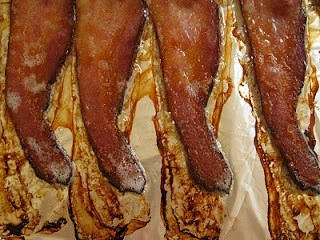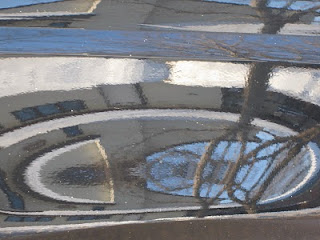
I began writing classes again this week, and in one of the classes, a student asked me for "tips on how to listen like you do." Huh. No one had asked me that before. She mentioned that while they frequently note (and they do, as a class) how closely I listen, no one had ever asked me how I listen, or how I know how to listen.
Then, she said, to my amusement: "I mean, any tips besides saying that we should just practice a lot. I mean, I know you get to do this a few times a week and have been doing it for years. What else can you tell us?" Which made all of us laugh, of course.
I promised her I would think on it.
And then I decided I would post on it, after I took some notes on a flight at 6am.
So here goes...
On ListeningLISTENING
The most important aspect of listening is raw perception. Letting whatever is being communicated to you flow into your ears without obstruction is the key to a practice of deep listening. Any kind of preparation or practice that encourages and sharpens your senses will help with deep listening, as well. Practice when out on walks, practice when at a movie, practice anywhere, even in your bed, waking up in the morning, noticing and focusing your senses.
Mingyur Rinpoche offers multiple options for "sense" meditation in his book
Joy of Living - but even informally, concentrating on your senses - WITHOUT INTERPRETATION - is key.
Why not interpret? Interpreting engages a part of the brain that will block the strength of your raw senses. Just as in other parts of writing practice, we "bracket" or temporarily dis-engage the critic, we also want to bracket the linear mind. Concepts do not mix well with perceptions - an aspect we practice in
Miksang photography. If you are thinking, you have left the perception and moved into the mind. The best interpretation, analysis or reflection comes from raw, open perceptions, including listening. Too many people feel they have to come up with a plan for what to say, how to offer insight to others when they respond (in my classes and in all of life). Let go of that: listen from the heart, I say, then you can speak back from that same place. Trust is key to this - that you don't have to know what you are going to say before you say it, just like you don't have to know what you are going to write before you write it. This is harder for some than others - but we all need to practice it, regardless.
What does raw perception feel like? How do you know you are doing it? One of my personal indicators - and yours could vary - is that I can relax enough to not listen to every single word as sharply. There's a sense of overallness, of space, and out of that space certain words or phrases seem to "stick up" (almost like hills on a landscape) and out to me. Those are the ones I write down. The more relaxed one is while listening, the better she can pick up on things like this. It is like the
Magic Eye 3-D images that were so popular about a decade ago - you can't find the image hidden in the clutter if you are "trying too hard." Of course, telling someone to not "try too hard" is like telling someone to relax - almost impossible. But I can guarantee that trying to catch "significant" things in someone's speech will backfire. Any way in which you can relax into listening, open up to the whole picture, and let certain things rise to the surface will help you. This is also what we could call taking in the "bigger picture" - literally and figuratively.
When I do write down words, I am trying to not attach to them. Sometimes when we listen we want to linger with a particular phrase or get caught or stuck on something said oddly or that triggers us. It is best to learn to make contact with what you are hearing directly, but then, let go. So even as I write it down, I am working to let it go.
Listen for: words that repeat, alliteration (repeated or similar consonant sounds) assonance (repeated or similar vowel sounds), repeated themes. Also significant can be changes in tone of voice, where someone stumbles, where they pause, and where they speed up or slow down in speech. Finally, I always note the first sentence they write and what they say about a piece (in class) before they read it, if anything. Again, as I say this, it's also best to understand that I don't mean "Listen hard for these," rather, these are the kinds of things that will pop up in the landscape and often point to a deeper emotional resistance or engagement going on.
What we are noticing, especially in writing practice but also in conversation, isn't the content, really. What we are noticing are patterns of mind, the way mind is organized, what it is focused on, how it comes back and when, when it gets distracted. So even as we note the content, the patterns - of speech, of thought - are often the most powerful parts to note.
So, also, it is good to pay attention to our listening - how are we responding? Do you feel yourself tense up, tighten down, open out when listening to this person? Notice your own physical responses - your desire to close your eyes, open them, look at the person, look away. Gently notice their body - are they open or closed? Notice the beauty and strength in every being - even in a business conversation or negotiation, filled with certain "rules" for how to engage, under someone's personality, under their affects (or even including them, sometimes) you can sense where and how they are vulnerable, and have compassion for them. Let your heart connect with their heart.
WHEN GIVING FEEDBACK
This part is more for the classes, but could be true in life. First and foremost, stick as much as you can to "
I Statements" - the main tool of psychotherapy and Non-Violent Communication. Make sure you aren't hiding judgment or projection behind your I Statements (lest they become passive aggressive). A real I Statement is something like this:
"I felt a sadness when I heard the part about your dog dying." A coy I Statement is something like this "I think you must have been so sad when your dog died." I Statements also work best when they lean on those raw perceptions I talked about above. So in this case, something akin to "I heard how you slowed down when you talked about your dog dying" is very powerful, and in a lot of ways, far more powerful than even your own feeling or projection into someone else's feelings.
I have recently been "reintroduced" to the power of this through my new therapist, who practices
Hakomi. The work of raw witnessing, of reflecting back more pure perceptions, is stunningly profound and simple. Most people work "too hard" on listening, and on trying to offer insight to others when they say something back. Giving someone a conclusion, an answer, an insight, is problematic for at least a couple of reasons. 1, it's your solution, not theirs. 2, if we go back to the old adage about giving a man a fish versus teaching him to fish, we can see that giving someone raw reflection can allow space for them to put the pieces together, and the pieces will fit better than if you do the assembly yourself. This also requires trust on the speaker's behalf - trust that "just listening" is enough. I myself in personal relationships work with this a lot, and having good friends and a wonderful partner who know when to "offer advice" and when to "just listen," as well as a new therapist who never offers advice and always "just listens" have all deepened my experiential understanding of how spacious and compassionate these kinds of simple feedback and confirmation are.
If you are in a group situation, as my students are, you can also trust that you are listening as a group. Let your raw perceptions speak, and others may hear things and make links you yourself would not make. It can become easy to come up with "some insight" and then attach to it, have it seem crucial, want to share it, feel that the person must hear it. We can be less attached and more present with raw perceptions, and the chance for our growth, as well as the growth of the recipient(s), is far stronger.





















